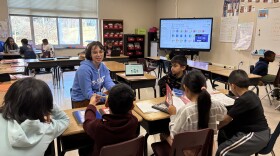Dwight Wadford climbs the wooden steps of the box stand. He’s a hunting mentor with Academics Afield — a hunter education program at North Carolina State University that teaches young adults how to hunt.
Kahron Guzman shoulders the rifle and clicks the safety off. He’s part of a new generation of hunters: Adults who don’t come from a hunting family and take up the activity later in life. He sights the bait — scattered corn in the field below — and pulls the trigger. The firing pin pushes forward in the unloaded rifle with a click.
Guzman replaces the safety on the firearm, and the pair of hunters settle in. The stand overlooks a clearing. It could take hours for a deer to wander into their area, if at all.
In North Carolina, hunting license sales have remained steady despite a national decline. However, an aging group of active hunters may spell trouble for state agencies that rely on license sales for funding. A new hunting education program targets university students to cultivate the next, more diverse generation of hunters.

The hunting community has a problem.
“A census of different outdoor recreation activities showed that 90% of hunters were men,” said Richard von Furstenberg, a Ph.D. candidate at NC State in the Department of Parks, Recreation and Tourism Management, “and 97% of those hunters were white.”
Von Furstenberg studies the relationship between hunting, society, and conservation. He’s interested in questions such as, why are there so few Black hunters? And what can be done to make hunting more “open and welcoming”?
The lack of diversity among active hunters is an issue, but the community is facing another existential threat: time.
“The last big group of traditional hunters, especially this older white male is now aging out of hunting,” von Furstenberg said. “There's few coming in behind them in terms of hunting participants.”
This is a big problem for one state agency in particular. Hunting and fishing license sales contribute to about a quarter of the North Carolina Wildlife Resources Commission’s approximately $85 million annual budget. License sales also determine a portion of the federal funding the agency receives.
Academics Afield began in Georgia in 2019. Von Furstenberg and Liz Rutledge, director of wildlife resources at the North Carolina Wildlife Federation, brought the program to NC State the following year.
“This program is geared towards students who are now in college,” said Rutledge, “who didn't grow up hunting or fishing or in rural environments where they had access to these opportunities.”

Not only are these young adult hunters coming from more diverse backgrounds, they’re hunting for different reasons.
“They want to know where their food came from, how it was harvested, and have a connection.”
Rutledge said these new, adult hunters are “conservation minded,” their interest in hunting stemming from an interest in the environment.
There are many barriers for potential hunters to overcome. Hunting requires both time and money — something college students often lack. But more than that, von Furstenberg says hunters need community.
“The biggest predictor of whether or not someone continues to hunt is support for hunting,” said von Furstenberg, “and typically whether somebody else in their family hunts.”

For 23-year-old Rosa DeLoach, who graduated from NC State in 2022, the program provided that social framework.
“There were a few things that did surprise me,” said DeLoach. “The encouragement from all of the mentors that they brought in to help us. And the emphasis that they put on you — (you) don't have to harvest an animal for it to be a successful hunt. It's just the act of getting outside.”
Walking back to the truck, Guzman still seems content with his hunting experience — even if he didn’t spot a single deer.
“I wish I did see something,” said Guzman. “But that’s why it's called hunting not shooting.”
Guzman said he would definitely be back in the woods again after his first hunting experience. For some, that’s a successful hunt.






